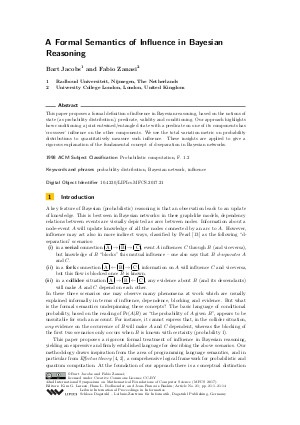A Formal Semantics of Influence in Bayesian Reasoning
Authors Bart Jacobs, Fabio Zanasi
-
Part of:
Volume:
42nd International Symposium on Mathematical Foundations of Computer Science (MFCS 2017)
Part of: Series: Leibniz International Proceedings in Informatics (LIPIcs)
Part of: Conference: Mathematical Foundations of Computer Science (MFCS) - License:
 Creative Commons Attribution 3.0 Unported license
Creative Commons Attribution 3.0 Unported license
- Publication Date: 2017-12-01
File

PDF
LIPIcs.MFCS.2017.21.pdf
- Filesize: 0.5 MB
- 14 pages
Document Identifiers
Subject Classification
Keywords
- probability distribution
- Bayesian network
- influence
Metrics
- Access Statistics
-
Total Accesses (updated on a weekly basis)
0PDF Downloads0Metadata Views
Abstract
This paper proposes a formal definition of influence in Bayesian reasoning, based on the notions of state (as probability distribution), predicate, validity and conditioning. Our approach highlights how conditioning a joint entwined/entangled state with a predicate on one of its components has 'crossover' influence on the other components. We use the total variation metric on probability distributions to quantitatively measure such influence. These insights are applied to give a rigorous explanation of the fundamental concept of d-separation in Bayesian networks.
Cite As Get BibTex
Bart Jacobs and Fabio Zanasi. A Formal Semantics of Influence in Bayesian Reasoning. In 42nd International Symposium on Mathematical Foundations of Computer Science (MFCS 2017). Leibniz International Proceedings in Informatics (LIPIcs), Volume 83, pp. 21:1-21:14, Schloss Dagstuhl – Leibniz-Zentrum für Informatik (2017)
https://doi.org/10.4230/LIPIcs.MFCS.2017.21
BibTex
@InProceedings{jacobs_et_al:LIPIcs.MFCS.2017.21,
author = {Jacobs, Bart and Zanasi, Fabio},
title = {{A Formal Semantics of Influence in Bayesian Reasoning}},
booktitle = {42nd International Symposium on Mathematical Foundations of Computer Science (MFCS 2017)},
pages = {21:1--21:14},
series = {Leibniz International Proceedings in Informatics (LIPIcs)},
ISBN = {978-3-95977-046-0},
ISSN = {1868-8969},
year = {2017},
volume = {83},
editor = {Larsen, Kim G. and Bodlaender, Hans L. and Raskin, Jean-Francois},
publisher = {Schloss Dagstuhl -- Leibniz-Zentrum f{\"u}r Informatik},
address = {Dagstuhl, Germany},
URL = {https://drops.dagstuhl.de/entities/document/10.4230/LIPIcs.MFCS.2017.21},
URN = {urn:nbn:de:0030-drops-80896},
doi = {10.4230/LIPIcs.MFCS.2017.21},
annote = {Keywords: probability distribution, Bayesian network, influence}
}
